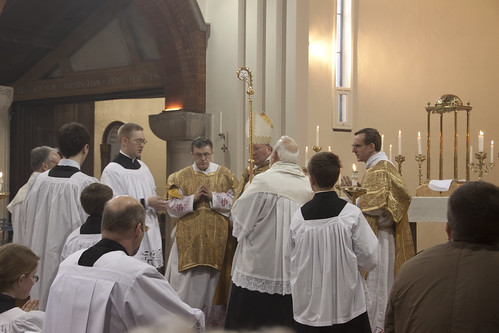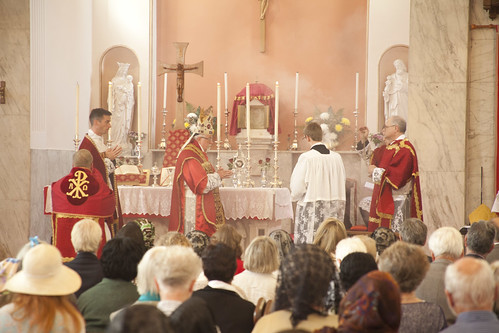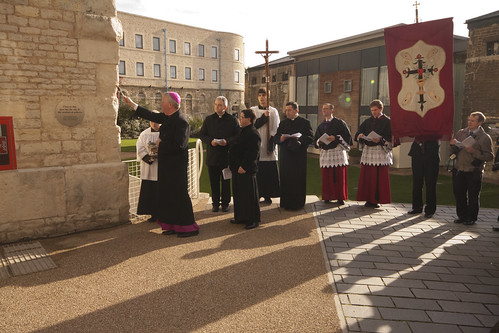He met him in Rome, when he was at the Redemporist monastery there and the Pope came to visit the parish. It was a formal occasion. The Redemptorists all lined up to greet the Pope. Having been told to kneel and kiss the Holy Father's ring, he decided to refuse - 'the Devil got into me', he says - and simply shook the Pope's hand. You only have to listen to the first minute or two to get the anecdote.
It reminds me of my meeting with Cardinal Hume. I was on the Ampleforth Pilgrimage to Lourdes, it was 1990 and I was 18. Cardinal Hume happened to be in Lourdes at the same time, with the Westminster Diocese Pilgrimage, and because of his connection with Ampleforth (he'd been Abbot before going to Westminster) he came to greet us. It was a formal occasion. We all lined up in a large semi-circle and he worked down the line shaking everyone's hand. I was some way down the line and watched this happening. Somehow the Devil - or something - got into me. I was a bit of a rebel, a non-conformist. When my turn came I broke the convention. I took his hand and kissed his ring.
The shattering of the convention was like a bolt of electricity. He sprang away from me as though I had bitten him.
If our Redemptorist priest heard this, he might object that I was just following a different convention, not overturning a convention. But as a matter of fact, although I was aware of the old custom, I had never experienced a milieu in which it was done. What the Redemptorist did, on the other hand, was to abandon a specifically Catholic and religious custom for the universal, secular convention. It was the action of a conventional person who gravitates to the most powerful, widespread convention, who can't cope with maintaining the counter-cultural conventions of the Church against those of the World.
So yes, I was young and foolish: I broke the convention. The Redemptorist claims, next, in the sermon, that Our Lord broke convention when handed the scroll in the synagogue in Caperneum (Luke 4:17): he says Our Lord chose a different passage to one set for the day. This is a fantasy, there is nothing in the text which suggests this. As a matter of fact Our Lord not only worshiped according to the customs of His age, but he kept the Law of Moses perfectly: the only man ever to have done so. When criticised for breaking rules, he never says 'Oh I can't be bothered with the Law of Moses, that's old hat, you need to chill out,' no, he explains that what he had done had not in fact infringed it.
 |
| Bishop Malcolm McMahon - now Archbishop of Liverpool - at an LMS Priest Training Conference |
Seeing Our Lord as a convention-breaker is very tempting, because convention-breaking is what we are all supposed to be doing all the time, but it is the wrong hermeneutic. When He touched the bier carrying the dead Son of the Widow of Naim (Luke 7:14) the onlookers would have thought that he would incur ritual impurity. It wasn't forbidden, some people had to deal with dead bodies, impurity wasn't permanent, but the Pharisees would have done their best to avoid doing it. But for Our Lord it was different: His touch purified, it raised the dead to life. Similarly, when he healed the Man with a Withered Hand on a Sabbath (Luke 6:6-11), it might have looked as though he was working and so breaking the Sabbath, but when Christ cures it is a symbol of the giving of spiritual life, and saving from death was always permitted on the Sabbath.
No, the Redemptorist and I have to think of some other justification, if any. We need to think about what breaking these conventions meant in our specific cases. By stepping outside the expected behaviour, we were making a statement. And the Redemptorist priest needs to be careful about praising the breaking of conventions, because he and I were making quite opposite statements when we broke the respective conventions, the one being followed by everyone else apart from us.
What does it mean to refuse to kiss the Pope's ring? I mean, to do that back in the days, perhaps twenty years ago or more, when attempts were still being made to insist on it at these occasions. It was a deliberate act of disrespect for the man and his office. It was a claim to equality of dignity, an equality of dignity which is only possible by pulling the Pope down to your own level.
 |
| Bishop Terence Drainey at the LMS York Pilgrimage 2012 |
As a young man - yes, I was young and foolish - I had a particular aversion to this kind of pretense. I wanted to prick the bubble of pompous nonsense. I thought it was dishonest. I might take a more nuanced view today. But at the time Cardinal Hume's reaction rather confirmed my feeling that we were being asked to maintain some kind of Emperor's New Clothes illusion. Why did he mind so much if I wanted to kiss his ring, a gesture of respect for his office? Presumably because it disturbed the impression he was eager to create, of relaxed informality in front of young people. Young people who were, in fact, not relaxed at all, but completely in awe of him - with the exception, I suppose, of the foolish youth who was cocky enough to break the convention.
 |
| Abbot Stonham of Belmont at the LMS Holywell Pilgrimage 2014 |
To reassert those traditional expectations and conventions today, we have flout the expectations and conventions which have replaced them. We have to be rebels in the cause of restoration. This is not an unprecedented situation by any means, but it confuses the liberals no end.
 |
| Archbishop Bernard Longley at the LMS Oxford Pilgrimage 2010 Support the Latin Mass Soeity: become an Anniversary Supporter! |
Great post with some interesting points. Much to think about.
ReplyDeleteFor much of its history Western Christianity - its organisational structures and hierarchies, its styles of liturgy, even its dominant image of God - has been based on the model of Roman imperialism. This is why Catholicism practised the secular sycophancy of kissing the rings of lords and masters: how odd that those who want to preserve the custom think they are doing something anti-secular. Maybe Cardinal Hume thought, as many do, that it's high time we got away from the imperialist travesty of the person of Christ and his Gospel. But centuries-long conditioning clearly still has a tenacious afterlife. As we know power and all its trappings is highly addictive.
ReplyDeleteKissing is a sign of respect and love, when Judas betrayed Jesus with a kiss, Jesus was particularly saddened that such an act of charity could be used to betray, perhaps you too Savonarola will only kiss to betray?
DeleteKind of you to imagine that, but you are wrong. I too will kiss to show love and respect - where it is appropriate to do so - but not as an act of abasement, which is what we are talking about here.
DeleteGrace completes nature. Roman imperium (nature, fallen as it may be) + grace of God = Christendom.
DeleteSavoranola: your comment is a classic. But when did you last kiss the ring or a secular potentate? When was the last time anyone did? It has been a specifically religious and Catholic custom for many, many centuries. Its origins, even if you are right about them, don't change that.
ReplyDeleteWell, your reply is quite a classic too. I can't recognise in the God of Jesus Christ a God who wants us to treat him or his representatives here like an ancien regime absolute monarch. That is what the gesture expresses, whatever gloss you put on it. The fact that the Church has been doing this
ReplyDeletefor centuries, and a few want to keep on doing it, only makes the Church look ridiculous - and repellent to ordinary people, including most Catholics today I would guess.
But that's the point. Kissing a prelate's ring isn't treating him like a monarch - it is treating him like a prelate. That's the culturally understood meaning, and has been for centuries.
DeleteCan you even cite historical examples of kissing secular dignories' rings?
DeleteThis comment has been removed by the author.
DeleteOh that's a pity, Savoralona, you've deleted your comment. But I've already read it. I see that you fail to cite any instances of ring-kissing in a secular context. Not to be confused with hand-kissing, of course, something which happens between social equals.
DeleteThe Ancien Regime isn't all that ancient. It is much more likely that the forms, courtesies, and rituals of the French monarchy were influenced by the the forms, courtesies, and rituals of the Church than the other way around. It was the Christian Catholic Church that nurtured, cultivated and corralled as needed the European monarchies, the Church being by far the more ancient institution.
DeleteYou seem to fear more weight upon the approbation of men than of God. Lamentable.
ReplyDeleteI guess I'll go ahead and continue to repel ordinary people then.
"For the word of the cross, to them indeed that perish, is foolishness; but to them that are saved, that is, to us, it is the power of God. For it is written: I will destroy the wisdom of the wise, and the prudence of the prudent I will reject." 1 Cor 1:18-19
Today's modern worldly culture spits upon obedience and servitude. I 100% encourage being counter-cultural and demonstrating that humility can be gratifying.
Maybe Cardinal Hume thought, as many do, that it's high time we got away from the imperialist travesty of the person of Christ and his Gospel.
ReplyDeletePerhaps Savaranola would have thought St. Mary Magdalene kissing the feet of Jesus was "imperialist travesty" too?
The Redemptorists in Ireland oppose the Deposit of Faith.
ReplyDelete